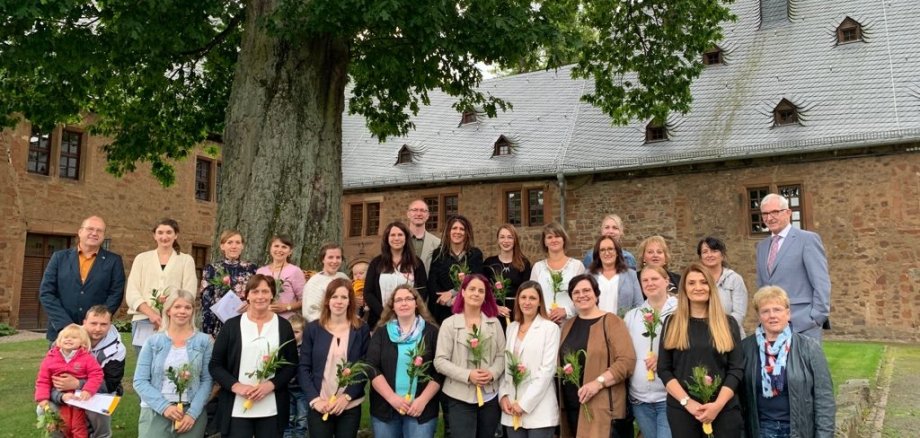New childminders in the district
Karl-Friedrich Frese, first district councillor and head of the youth department, welcomed 20 new childminders to the ranks of the childminders in the district of Waldeck-Frankenberg. They received certificates for having successfully passed their basic qualification as child minders. As it was not possible to hold a ceremony last year due to the contact restrictions of the Corona pandemic, it was now made up for along with this year's. The inner courtyard of the former St. Georgenberg monastery in Frankenberg, now the site of the administrative office of the district, provided the appropriate festive ambience.
"We even have two men from last year," said Monika Padberg-Koert, supervisor of child day care at the district, pleased about the interest of the two new child minders in the basic qualification. Also pleasing, as Frese, head of the youth department, agreed: "The restrictions due to the pandemic have had no effect on the willingness of interested persons to qualify. On the contrary - while there were 7 course participants in the 2020 training course, this number has almost doubled to 13 ladies and gentlemen in the current 2021 course.
In his address to the qualified persons, the First District Commissioner pointed out that day care is an indispensable childcare service in the district, especially for children under the age of three. That is why it has been steadily expanded. "Good qualifications are particularly important for childminders," Frese emphasised, adding that the demands on childminders are increasing from year to year. The contents of the course are correspondingly demanding.
The qualification measures have been carried out for many years by the Kreisvolkshochschule, whose director Manuel Wolf pointed out the good cooperation between the vhs and the district. Since 2020, the basic qualification has been carried out in accordance with the competence-oriented qualification manual for child day care - 300 teaching units, 160 of which as a preparatory phase for teaching the necessary competences and 140 as an accompanying phase for expanding and deepening the acquired competences. Due to the necessary distance rules in connection with the pandemic, however, not all teaching units could be offered in presence, but were partly offered digitally. This hybrid form, however, proved just as successful as the usual pure classroom training and helped all participants to achieve a good result.
